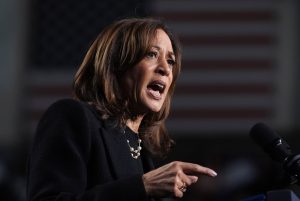
Warren sails to victory over Deaton, secures third term in U.S. Senate
To the surprise of probably no one, Elizabeth Warren has been declared the winner of the U.S. Senate race by the Associated Press, citing early returns which showed her with an insurmountable lead over Republican challenger John Deaton.
With her win, the 75-year-old senator has secured a third six-year term as the Bay State’s younger but more senior upper-chamber lawmaker, a position she will hold well into her 80s.
Warren’s victory against Deaton, a political newcomer and recent Massachusetts transplant, was forecast by both polling and fundraising, and heading into election night she held a 21-point lead in surveys and had millions more cash on hand. She trailed support for Vice President Kamala Harris by two points.
Deaton ran a campaign focused on his ability to be a voice from the outside, frequently noting the more-than-a-decade Warren has spent in office as proof she doesn’t have the clout in D.C. — or the will — to step outside the party lines and get work done.
Warren pushed back on those assertions, pointing to a decade of legislative accomplishments and their direct impact on Bay State residents. She’s taken credit for work done to pass laws like the Inflation Reduction Act, American Rescue Plan act, and the Bipartisan Infrastructure Law, and for securing the funding required to begin large scale projects like the replacing the Cape Cod Bridges.
Deaton’s candidacy was notable for a number of reasons, not the least of which was his start outside of Massachusetts. A retired U.S. Marine who moved to the Bay State from Rhode Island in January, Deaton is originally from Detroit, Michigan.
After announcing his intention to run against Warren in February, the former prosecutor immediately struck a path away from his fellow Republicans, and frequently attempted to draw a line between himself and his party’s presidential candidate. Deaton, he said in May, was not a Trump Republican, but a John Deaton Republican.
He revealed this weekend that he hadn’t voted for Trump in 2016 or in 2020, citing his comments regarding John McCain’s military service, and at one point made the case that Trump’s electoral success — 74 million people voted for him — demonstrated how frustrated people were with establishment politicians.
He pushed a scrappy underdog story that included tales of growing up poor in an abusive environment. His success in the military, as an attorney, and his crypto fortune served to make him seem an entirely self-made mad who looked to get things done in Washington D.C. paralyzed by partisanship and not helped, he said, but more of Elizabeth Warren.
It took less than 10 minutes after polls closed to show that Massachusetts voters entirely disagreed with him.
Warren, for her part, ran a campaign focused on the same things she’s focused on since before she was a U.S. Senator: lowering costs, taking on Wall Street and the big banks, and reigning in an out-of-control wealth gap.
This is a developing story and it will be updated.

